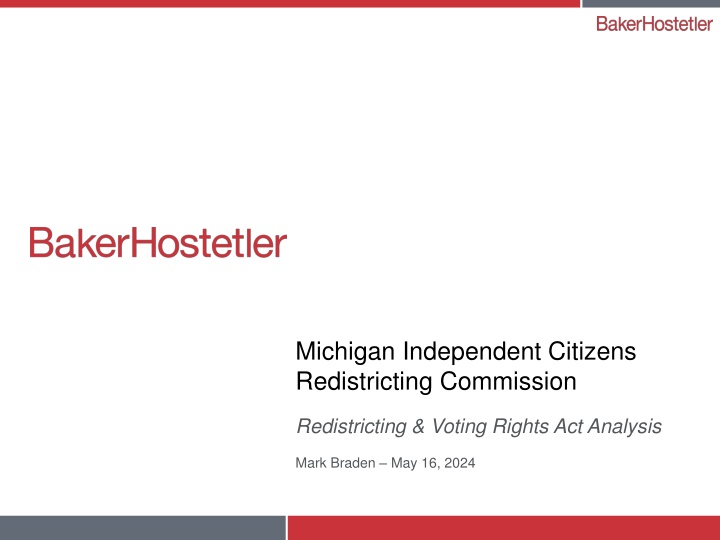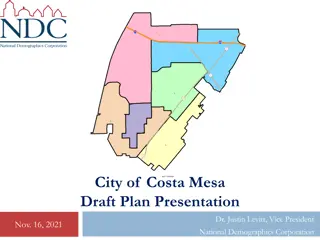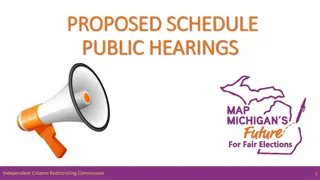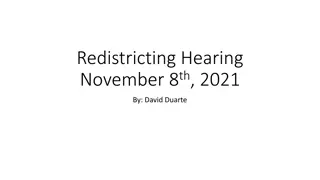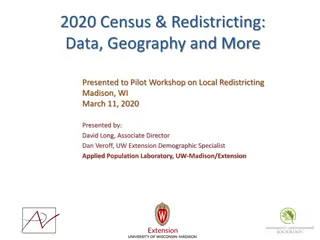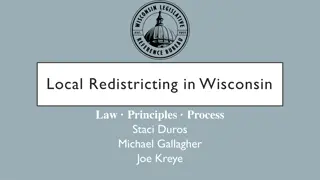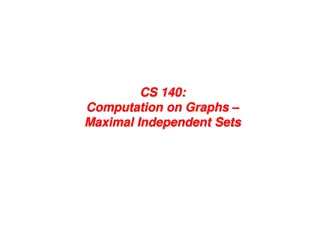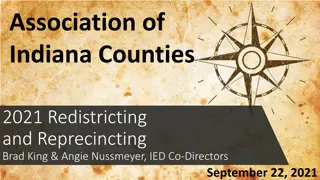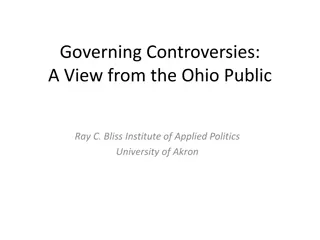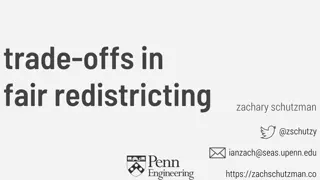Michigan Independent Citizens Redistricting Commission: VRA Analysis
This presentation by Mark Braden on the Michigan Independent Citizens Redistricting Commission's analysis of the Voting Rights Act focuses on reviewing Senate plans with regards to Black voters' opportunity to elect representatives. The discussion includes the requirements of the VRA, Gingles criteria, and the process for assessing compliance with the act without offering opinions on constitutional requirements. The presentation emphasizes the importance of ensuring a reasonably equal opportunity for Black voters to elect their preferred candidates.
Download Presentation

Please find below an Image/Link to download the presentation.
The content on the website is provided AS IS for your information and personal use only. It may not be sold, licensed, or shared on other websites without obtaining consent from the author.If you encounter any issues during the download, it is possible that the publisher has removed the file from their server.
You are allowed to download the files provided on this website for personal or commercial use, subject to the condition that they are used lawfully. All files are the property of their respective owners.
The content on the website is provided AS IS for your information and personal use only. It may not be sold, licensed, or shared on other websites without obtaining consent from the author.
E N D
Presentation Transcript
Michigan Independent Citizens Redistricting Commission Redistricting & Voting Rights Act Analysis Mark Braden May 16, 2024
Overview Objectives for this presentation: 1. Brief recap of the requirements of the Voting Rights Act ( VRA ). 2. Review of the Senate plans provided by the Commission to Dr. Palmer and myself. Principally, addressing the opportunity of Black voters to elect representatives of their choice to the Michigan Senate. 3. No opinion will be offered on plan compliance with Michigan Constitutional requirements. I will offer only an opinion on draft plans compliance with VRA.
Section 2 of the VRA, Gingles To prove a 2 violation under Gingles, plaintiffs must satisfy three preconditions. 1. The minority group must be sufficiently large and [geographically] compact to constitute a majority in a reasonably configured district. 2. The minority group must be able to show that it is politically cohesive. 3. The minority must be able to demonstrate that the white majority votes sufficiently as a bloc to enable it to defeat the minority s preferred candidate.
A plaintiff who demonstrates the three Gingles preconditions must then show, under the totality of circumstances, that the challenged political process is not equally open to minority voters. The totality of circumstances inquiry recognized that application of the Gingles factors is fact-dependent and requires courts to conduct an intensely local appraisal: of the electoral mechanism at issue, as well as a searching practical evaluation of the past and present reality. There is no genuine issue that Gingles requires a review of any Michigan Senate plan for compliance with the VRA. The Commission, its experts, the Court and plaintiffs agree that legally significant polarization is present.
Review Process Not reviewing plans for compliance with Michigan Constitutional requirements. Scope of Review Any opinions on VRA compliance are based on the assumption that the reviewed proposed Senate districts are (1) reasonably configured and (2) race was not impermissibly used in the creation of any plans. The question is: Does a particular Senate plan provide a reasonably equal opportunity for Black voters to elect their candidates of choice? How? The answer is not based on how many majority/minority districts are in a plan or any set racial target. An answer is based on how many districts will likely perform with the election of Black voters candidates of choice. The State of Michigan, through this Commission, can decide whether to create majority/minority districts, crossover districts or some combination for compliance with the VRA. Result?
Minority Voters Ability to Elect Candidates of Choice Two types of elections are considered. A. General Elections Analysis of plans based on recompiled elections results. B. Primary Elections Analysis of plans relies on estimates of Black and White turnout in the Democratic primary election, with an eye to whether Black turnout is likely to exceed White turnout in a proposed district. The reasonably-equal-opportunity analysis does not guarantee any particular election results.
